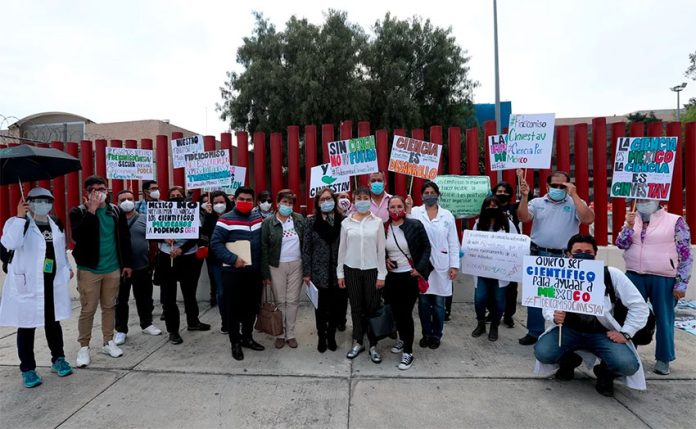Opposition to the federal government’s plan to abolish 109 public trusts is growing as senators prepare to vote as soon as Tuesday on the proposal that has already been approved by the lower house of Congress.
A protest was held outside the federal Senate building in Mexico City on Monday while Mexican and foreign scientists have denounced the plan, which would transfer control of the trusts’ funds – they were allocated some 68 billion pesos (US $3.2 billion) this year alone – to the federal Interior Ministry.
Government watchdog Causa en Común (Common Cause) said earlier this month that funding for scientific research, cultural projects, disaster response, the defense of human rights, the protection of journalists, agricultural development, scholarships for students and attending to victims of crime would be placed at risk if the plan is approved.
Members of human rights collectives and family members of victims of violent crimes yesterday blocked one of the entrances to the Senate building to express their opposition to the plan, which President López Obrador supports on the grounds that the trusts represent opportunities for corruption.
The newspaper Reforma reported that the protesters were able to convey a message to ruling Morena party Senator Alejandro Armenta.
“You [members of the government] say ‘with the [support of the] people everything [can be done] and without the people nothing.’ Well the people are demanding that you don’t eliminate the trusts,” protester Karla Guerrero told Armenta.
“Morena cannot make history looking down on victims,” said Guadalupe Mendiola, making reference to the name of the coalition the ruling party led at the 2018 election – Juntos Haremos Historia, or Together We Will Make History.
Reforma reported that the Senate’s regular activities could not go ahead due to the blockade and that lawmakers retreated to a nearby hotel to discuss the proposal.
However, the plan has now passed the Senate’s finance committee, with only one Morena party lawmaker voting against it.
With the support of its allies, Morena has a majority in the upper house of Congress, meaning that the approval of the plan appears to be a mere formality.
Brenda Valderrama, a biotechnology researcher at the National Autonomous University and president of the Morelos Academy of Sciences, told a virtual press conference Monday that 15 senators affiliated with Morena would have to vote against the plan in order for the trusts to survive.

Speaking on behalf of a collective of academic associations, societies and academies that have formed virtually under the hashtag #MásCienciaMenosObediencia (More Science Less Obedience), Valderrama urged senators to vote against the proposal, asserting that there is “abundant and conclusive evidence of the damage” the abolition of the trusts would do to the country.
She specifically appealed for the support of Morena party Senator María Celeste Sánchez Sugia, a fellow scientific researcher.
Valderrama said that opposition parties have rejected the proposal but stressed that the votes of their senators won’t be enough to stop it.
“Even with this support, we still need 15 [more] votes to avoid the disappearance of the research funds,” she said. “We demand that senators who have not spoken out against the proposal do so.”
Other academics who spoke at the virtual press conference said that 127 personalized letters have been sent to senators urging them to vote against the abolition of the trusts but none of the lawmakers has responded.
They argued that the elimination of the trusts, many of which support scientific research and none of which face formal corruption allegations, would represent a backward step. The academics said the country could return to times when public funding went to a select few researchers chosen by bureaucrats rather than specialist panels.
Several academics have already said that the abolition of the trusts would deal a historic blow to science and culture.
Causa en Común said that the elimination of the trusts would cause “incalculable damage,” while a group of 10 dissident state governors questioned the legality of the proposal.
Members of the #MásCienciaMenosObediencia were planning to protest outside the Senate today while a vote on the proposal could be taking place.
Mexican academics opposed to the abolition of the trusts are supported by more than 700 international scientists and researchers who put their names to a “Letter in Support of Mexican Scientists” that was recently published online and shared extensively on social media.
They described the move as “a heavy blow to science and technology in Mexico right when the country needs their contribution more than ever” in a letter signed by academics from universities all over the world including prestigious educational institutes such as Harvard, Oxford and Yale.
The international academics asserted that the abolition of the public trusts would close the door on new funding from private, international and multinational organizations that currently support academic research in Mexico.
“We are concerned that collaboration with Mexican colleagues, with whom we share interests and research projects, will be considerably limited.”
Opposition politicians claim that the funds currently held by the trusts will be used for discretionary spending by the federal government.
Source: Reforma (sp), El Universal (sp)
